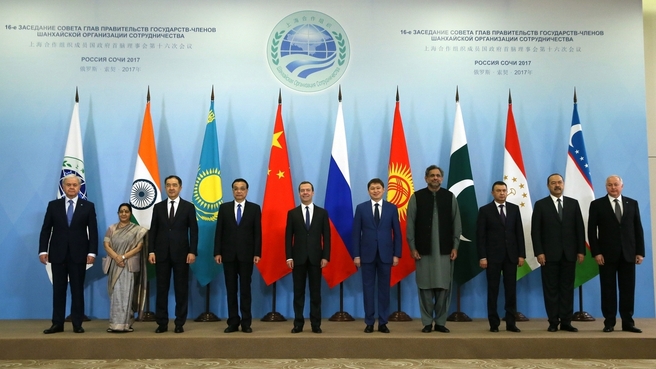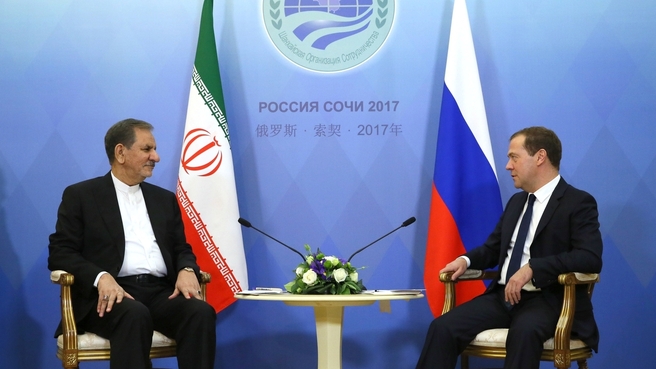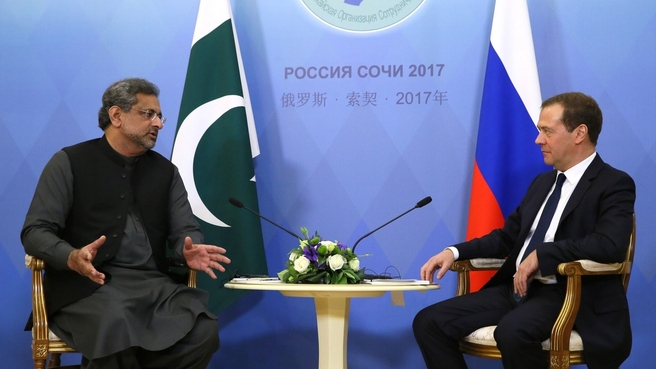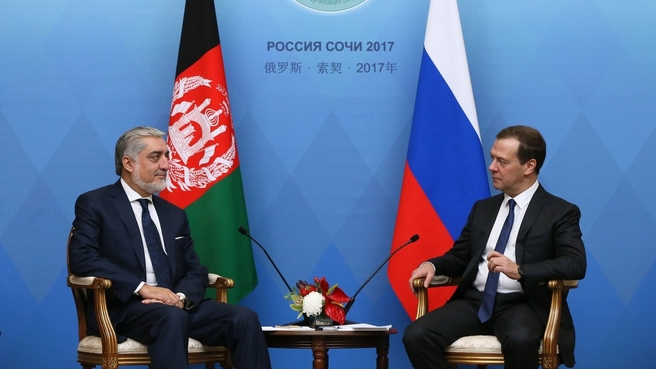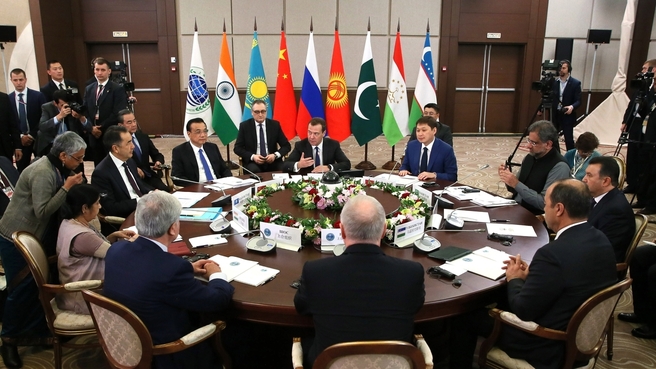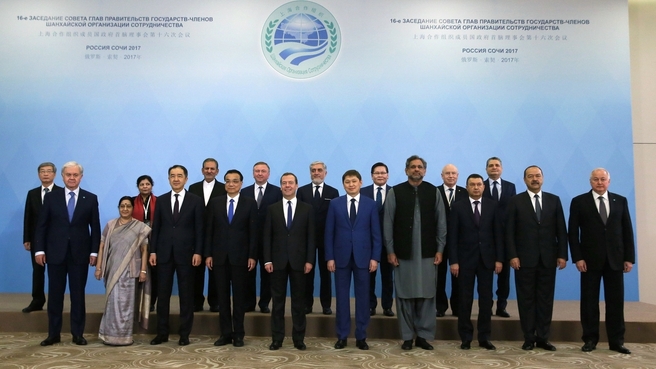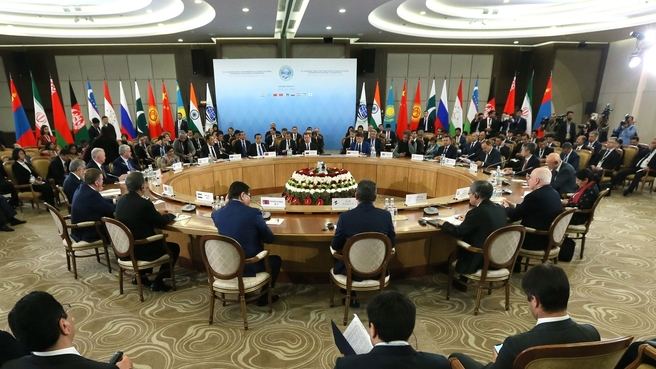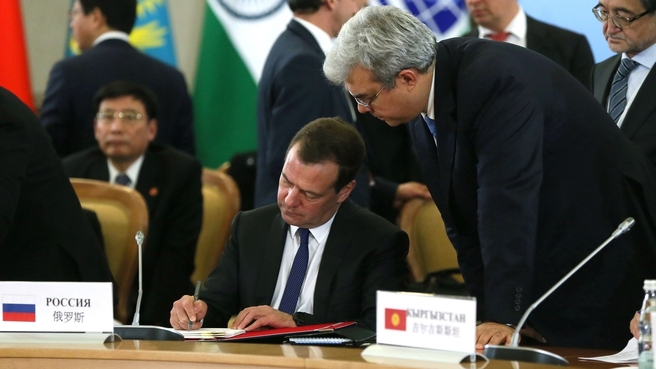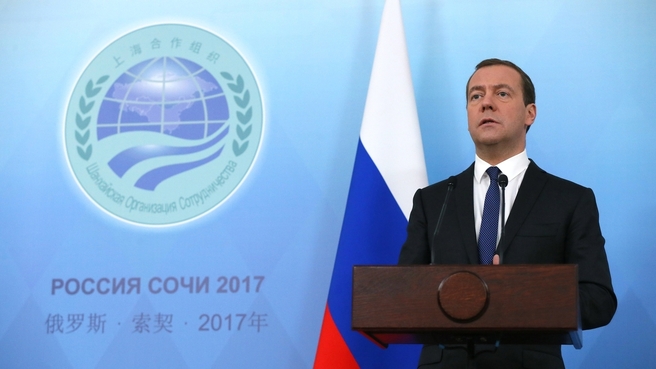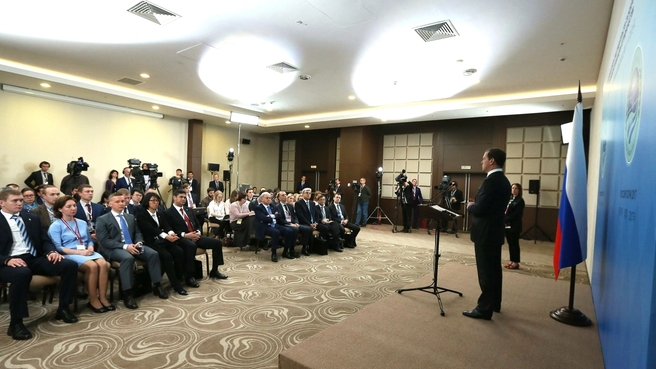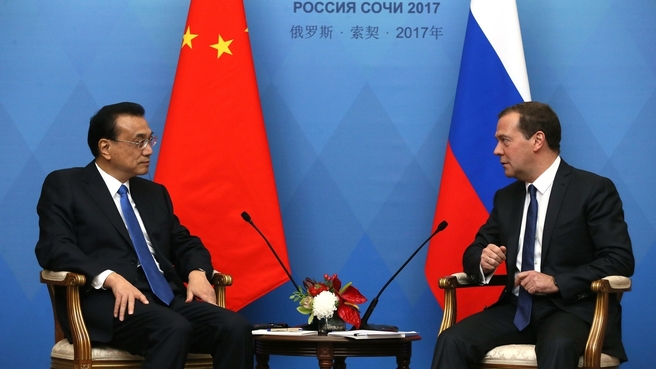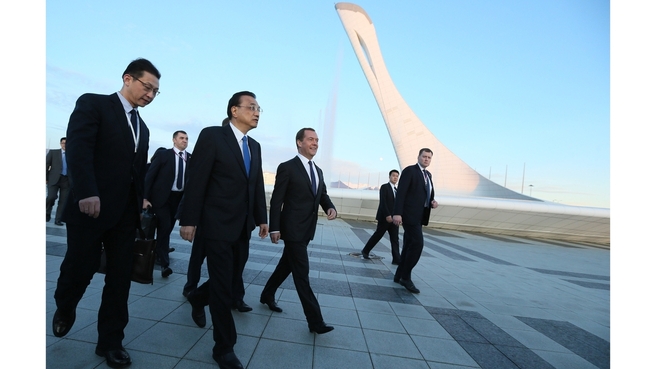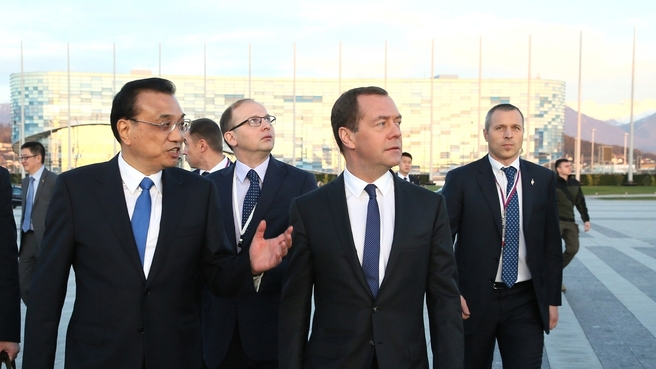Dmitry Medvedev: “The Shanghai Cooperation Organisation is a suitable venue for joining national strategies, trans-border projects and multilateral cooperation initiatives. We need to continue strengthening the SCO’s role and reputation in the global economy”.
Dmitry Medvedev’s speech at the SCO Heads of Government Council restricted attendance meeting
Dmitry Medvedev’s remarks at the expanded meeting of the SCO Heads of Government Council
Documents signed following the meeting
News conference by Dmitry Medvedev following the meeting
Heads of delegations of SCO member states:
Joint photo session of the heads of the SCO member states’ delegations
Joint photo session of the heads of the SCO member states’ delegations
Foreign Minister of India Sushma Swaraj;
Prime Minister of Kazakhstan Bakhytzhan Sagintayev;
Prime Minister of the People’s Republic of China Li Keqiang;
Prime Minister of Kyrgyzstan Sapar Isakov;
Prime Minister of Pakistan Shahid Khaqan Abbasi;
Prime Minister of Russia Dmitry Medvedev;
Prime Minister of Tajikistan Kokhir Rasulzoda;
Prime Minister of Uzbekistan Abdulla Aripov.
Dmitry Medvedev’s speech at the SCO Heads of Government Council restricted attendance meeting:
Our meeting today is special. For the first time, our colleagues from India and Pakistan will participate in the SCO Heads of Government Council Meeting. Today, Russia’s chairmanship in the Heads of Government Council ends. Our work’s priority was to give a new impetus to the organisation’s development and, of course, to promote trade, economic and humanitarian ties and to ensure security.
I hope that the discussion both in restricted attendance and expanded formats will enhance effective connections on our already widened platform for national development strategies and integration initiatives.
In any case, we must think about the future and move forward.
Dmitry Medvedev’s remarks at the expanded meeting of the SCO Heads of Government Council:
The cooperation potential between the SCO member states has been strengthened by the accession of India and Pakistan. When we exchanged opinions, we stressed the need to broaden cooperation with our observer states, which are present here, dialogue partners and international organisations.
There is great demand for this approach due to the current global situation and issues in the world economy, as well as in building a just and equitable architecture of sustainable security in the SCO area and in the entire Asia-Pacific Region.
The accession of India and Pakistan to the SCO last June means that the organisation is rising and promoting practical cooperation in all areas, from the economy to security.
Retrospective
-
Meeting of the SCO Council of Heads of Government, 3 November 2016
-
Meeting of the SCO Council of Heads of Government, 15 December 2015
-
Meeting of the SCO Council of Heads of Government, 15 December 2014
-
Meeting of the Council of SCO Heads of Government, 29 November 2013
-
Meeting of the Council of SCO Heads of Government, 5 December 2012
Regional conflicts are still present; moreover, some of them have even become more acute. There is tough competition for political influence, natural resources, markets and control over key trade routes. We are witnessing a turn towards the so-called new protectionism. Moreover, some states are using unilateral sanctions to gain certain advantages.
International terrorism is a very serious challenge for us. A crushing blow has been dealt to the militants in Syria by the combined efforts of Russia and our partners from Iran and Turkey, as well as other parties concerned. But ISIS remains a major threat.
The situation in Afghanistan, an observer state in our Organisation, is also far from calm. We support the processes of national reconciliation and economic revival in that country. We consider the practical aspects of these issues at the SCO-Afghanistan contact group. This forum first met in Moscow in October.
It is of importance to induce the business communities in our countries to join the common economic development efforts, including with the help of the Business Council and the SCO Interbank Consortium. Russia’s trade with other SCO member states will amount to over $80 billion as of the yearend.
Inter-regional cooperation is another promising area. I am confident that our initiative to establish a forum of the heads of SCO regions will promote our cooperation. I suggest that the launch of this new venue be timed to coincide with the SCO summit in Qingdao in June 2018.
Trip
The Forum on Small Business of the SCO and BRICS Regions in Ufa has proved its worth.
Transport cooperation has made progress as well. We
should start implementing intergovernmental agreements on facilitating
international road traffic. Joint work in rail and air transport area could be
the next stage. We are also intensifying energy cooperation, primarily at the
SCO Energy Club.
One more important subject is the development of ties in agriculture. Laying emphasis on food security, Russia is ready to take part in this cooperation and supply all interested parties with agricultural produce. This year we have collected a record harvest of grain – almost 140 million tonnes, which creates an additional opportunity to consolidate food security both in the SCO and on a global scale.
The opportunities of qualitative growth at the expense of cheap labour and raw materials exports have been practically exhausted. It is necessary to develop innovative production lines with high added value.
The SCO states may seriously contribute to global progress. We have advanced technology and competences in space exploration, aircraft engineering, car making, nuclear power engineering, the electronics industry and IT. We have highly qualified personnel and educational institutions. We must also develop professional teams that are engaged in such educational projects as WorldSkills. We are ready to share experience, including at a regular championship in Kazan in 2019.
The Shanghai Cooperation Organisation is a suitable venue for joining national strategies, trans-border projects and multilateral integration initiatives. In cooperation with our partners in the Eurasian Economic Union (EAEU) and China we are actively aligning the development of the EAEU with the One Belt One Road initiative.
Russia has suggested an initiative on forming a Greater Eurasian partnership. We should move to this project by signing bilateral and multilateral trade and economic agreements. We have already made substantial progress on this road.
The next meeting will take place in Tajikistan in
2018, which will take over the presidency in the SCO Heads of Government
Council.
Documents signed following the meeting:
Agreement on Forming and Implementing the SCO Budget;
SCO Heads of Government Council (Prime Ministers) decisions regarding:
- The SCO Secretariat Report
on the Implementation of the Programme of Multilateral Trade and Economic
Cooperation of SCO Member States;
- The SCO Financial Report on the Implementation of the SCO Budget for 2016;
- Advance Payments of SCO Member
States to the SCO Working Capital Fund;
- The SCO Budget for 2018;
Joint Communiqué Following the SCO Heads of Government Council (Prime Ministers) meeting.
News conference by Dmitry Medvedev following the meeting
Excerpts from the transcript:
Possible admission of Iran and Afghanistan to the SCO
It is true that there are such applications from Iran and Afghanistan, while these countries have been SCO observer states for quite a long time.
Today we see no obstacles to Iran joining the organisation, if we are talking about practical matters. Earlier we faced complications related to settling the high-profile international problem of that country’s nuclear status. Now these problems are in the past. And indeed our partners would like to do this, but all decisions on admitting new members to the Shanghai Cooperation Organisation are made by consensus. We must comply with the procedures in Iran’s case and, potentially, in Afghanistan’s, which has also applied. The situation in Afghanistan is rather complicated now due to very difficult political factors, and it is combatting terrorism. Together with a number of other countries, we provide corresponding support to that country. It is probable that, when making any decisions on the possible admission of Afghanistan to the SCO, we will have to take into account the current political situation. We have already said many times that we want to help the national reconciliation process in Afghanistan. The SCO has already chosen the agency, which will be responsible for these issues in the SCO-Afghanistan format. We do all that we can to encourage such processes as part of our bilateral agenda. I believe that these decisions will eventually be made, but we will need a consensus of the member states and a suitable political situation for that.
Settlement of the North Korea issue
The SCO was created primarily as a platform to ensure the security of the SCO member countries. Quite a few things have been accomplished: the Regional Anti-Terrorist Structure has become operational, as well as other bodies, which provide recommendations on ways to avoid complex consequences that may arise in certain situations.
There is a well-known Russian-Chinese initiative on ways to settle the North Korean issue, which has been exacerbated lately. In fact, this initiative provides for a roadmap which could also be viewed within the SCO format as a joint project. The “double freeze” idea is proposed within the framework of this roadmap, where all the parties that are currently in a phase of pitched confrontation (namely, North Korea, on the one hand, and South Korea and its allies, primarily, the United States, on the other hand), abandon actions that provoke the build-up of tensions, including nuclear tests, missile launches, speaking of North Korea, and large-scale exercises that are constantly being conducted in that region and understandably exasperate the North Korean regime, speaking of South Korea and its allies.
I think we can achieve something major if we take the Russian-Chinese proposal as a basis and combine it with the capabilities of the Shanghai Cooperation Organisation.
Creating a free trade area of SCO countries
We are now discussing many things related to creating free trade areas. Above all, this concerns our primary integration association, which is the Eurasian Economic Union. We have already signed one such agreement with Vietnam, and a free trade area has been created. It is already operational. Several other candidates, such as Singapore, Israel, Iran, and some other countries, are next in line within the framework of the Eurasian Economic Union. However, it is always a fairly complicated process of reconciling economic interests, primarily tariff policies, all kinds of constraints, and promotion of national products and brands.
In terms of creating such an area within the Shanghai Cooperation Organisation and a common treaty, it is a larger and more complex task. Currently, we are negotiating with the EAEU, on the one hand, and the People's Republic of China, on the other hand. So, we first need to have some practice using this model. However, in principle, I do not rule out the possibility that we will achieve such agreements within the Shanghai Cooperation Organisation someday. However, this is a higher degree of integration and trust, which should be achieved through talks with the participation of all the SCO members.
SCO competition with other economic blocs
The world is moving toward regional integration. As a matter of fact, this is a global trend.
The Shanghai Cooperation Organisation was originally designed as an organisation which deals with policy coordination on security issues. However, we have advanced and now deal with economic cooperation and potential economic integration. The Shanghai Cooperation Organisation is fairly large now, at least in terms of the population of the countries that are represented by the SCO. The economies that make it up also matter in the global economy. Of course, we can also consider this economic aspect of promoting relations within the SCO.
This need not necessarily be forms of integration such as a free trade agreement or some other, more advanced forms of economic integration. If we manage to implement at least the current projects within the SCO, which are fairly large, such as in the sphere of roads and infrastructure, then it will already be a gigantic move forward. However, we will still have to agree on a number of issues, including individual mechanisms for economic cooperation within the SCO, because the discussions about the SCO bank or the SCO special account have been underway for the past ten years. It is time to go ahead and sign agreements on these matters rather than keep treading water. Everything is in our hands.
